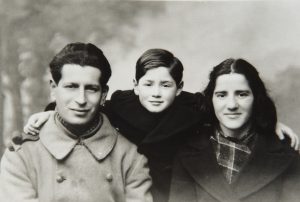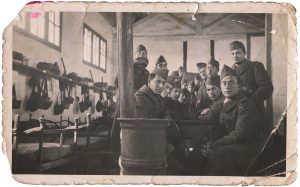The voluntary recruits of June 7, 1940
Photo 1: Joseph Zytnicki enlisted as a volunteer soldier in September 1939, in our photo in the foreground on the left at the Barcarès camp. He joined the 21st RMVE, trained at the camp of Barcarès in October 1939. The regiment made movement on April 30, 1940 towards Alsace then the Ardennes where it was assigned to the 35th infantry division. It undergoes a German attack on June 9 and 10 with significant losses. He withdraws towards Sainte-Menehould and continues until reaching Allain on June 19. Joseph Zytnicki falls in battle on June 18, 1940. His regiment received the order for a ceasefire on June 22.
Credits: Memorial of the Shoah/coll. Henri Zytnicki
On 1 September 1939, after the entry of German troops into Poland, the council of ministers decided on general mobilization. Public opinion oscillates between recission and determination to put an end to Germany’s coups de force. French Jews respond to mobilization instructions like the entire French population. Foreign Jews present themselves massively in the enlistment offices. More than 25,000 Jewish volunteers are incorporated either in the regiments of foreign volunteers (RMVE), or in the infantry of the Foreign Legion, or in the Polish army reconstituted on French territory and in the Czechoslovak army.
Only a part of the volunteers will actually be incorporated throughout the winter of 1939 and the spring of 1940, depending on the needs, the resources in equipment often defective and in host structure. Out of 83,000 applications, 43,000 foreigners will be incorporated, including 25,000 Jews. In the face of the German offensive on 10 May 1940, the fighting was fierce and the role of these units was predominant. The bravery of these men is remarkable. Out of thirteen palms obtained by units during the 1939-1940 campaign, five were acquired by foreign regiments. Thousands of soldiers are killed in battle. A large number is captured and interned in Germany.
(excerpts: The Jews of France in the Shoah, Jacques Fredj, ed. Gallimard and the foreign Jewish volunteers in the French armies during the two world wars, under the direction of Olivier Lalieu, ed. Memorial of the Shoah)

Photo 2: Joseph Zytnicki, his wife Brucha Zytnicki and his son Henri. Brucha, resistant to the UJRE (Union of Jews for Resistance and Mutual Aid), succeeds in hiding her son Henri in Murat in Auvergne near Alice Ferrière, teacher.
Credits: Memorial of the Shoah/coll. Henri Zytnicki


